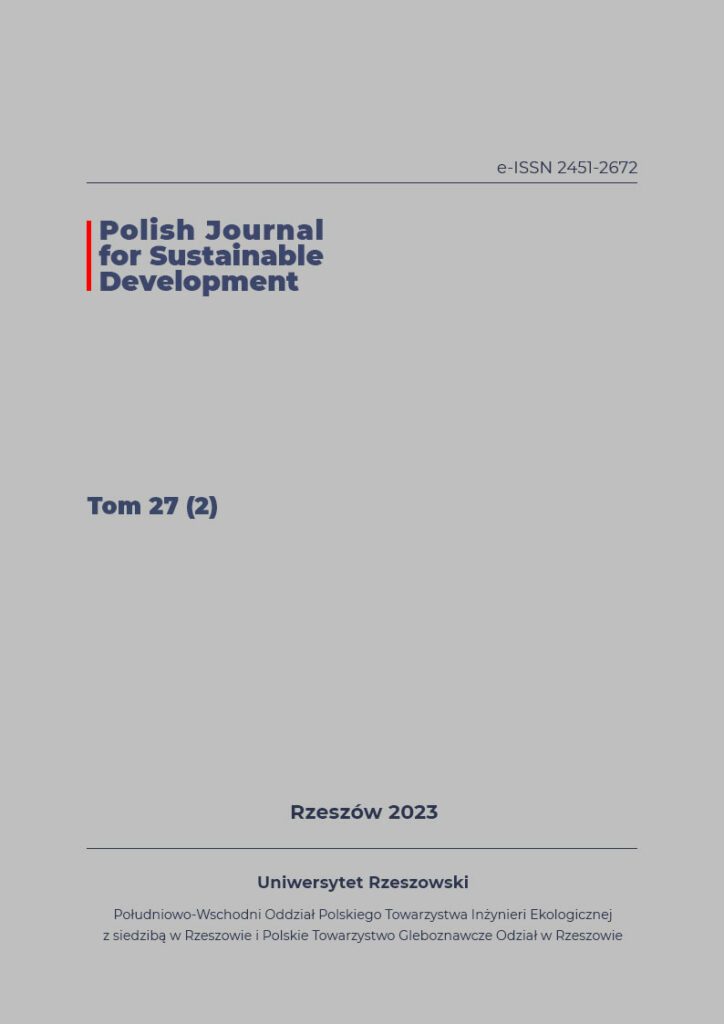Estimation of bio-waste potential in an example municipality
DOI:
https://doi.org/10.15584/pjsd.2023.27.2.4Keywords:
municipal waste, organic recycling, reporting, surveyAbstract
National Waste Management Plan 2028 comprises goals and tasks also in the field of selective collection of bio-waste from residents as well as increased organic recycling by promoting composting of bio-waste by residents "at the source". European Union guidelines require reporting and present two methods of obtaining data: indirect and direct (including surveys). Actual measurement of the input or output from the recycling process is not always possible and therefore attention is paid to the high level of confidence in the data. In 2023, an attempt was made to determine the mass of bio-waste and factors which influence it, based on surveys in the Słomniki commune. In the Słomniki commune 3689 farms were established, of which 2709 declared composting activities. There were 30 responses of groups of people declaring composting and 15 responses of people who did not declare composting. Conducted survey researches showed high diversity of estimated mass of bio-waste generated in both groups. There is high probability of underestimating the mass of bio-waste at the municipal level, calculated taking into account the morphological composition and mass of waste generated. The underestimation of the mass of bio-waste may result from grass mulching practices, which were declared by at least 20% of respondents.
Downloads
References
BDL GUS-Bank Danych Lokalnych GUS. [dokument elektr. https://stat.gov.pl/badania-statystyczne/. z dnia15.09.2023].
Bednarczuk A., Śleszyński J. 2019. Marnotrawstwo żywności–problem pomiaru i dostępności danych. Optimum. Economic Studies. 3 (97). 19-32.
Ćwiek P. 2020. Selektywne zbieranie odpadów biodegradowalnych. [dokument elektr. https://sip.lex.pl/komentarze-i-publikacje/komentarze-praktyczne/selektywne-zbieranieodpadow-biodegradowalnych-470136108, z dnia 15.09.2023].
Decyzja Wykonawcza Komisji (UE) 2019/1004 określająca zasady obliczenia, weryfikacji i zgłaszania danych dotyczących odpadów zgodnie z dyrektywą Parlamentu Europejskiego i Rady 2008/98/WE oraz uchylającą decyzję wykonawczą Komisji C (2012) 2384.
Dronia W., Połomka J., Jędrczak A. 2023. Morphological composition of bio-waste collected selectively in towns and villages during autumn and winter. Journal of the Air and Waste Management Association. 73(4). 313-320.
Favoino E., Giavini M. 2020. Bio-waste generation in the EU: Current capture levels and future potential. This report was commissioned by the Bio-based Industries Consortium (Bio-based Industries Consortium). pp 50.
Giordano C., Alboni F., Falasconi L. 2019. Quantities, determinants, and awareness of households’ food waste in Italy: A comparison between diary and questionnaires quantities. Sustainability. 11(12). 3381.
Hanc A., Novak P., Dvorak M., Habart J., Svehla P. 2011. Composition and parameters of household bio-waste in four seasons. Waste Manag. 31(7). 1450-1460.
Hryb W., Ceglarz K. 2021. W aspekcie gospodarki o obiegu zamkniętym. Gliwice. Wyd. Politechniki Śląskiej.
Jędrczak A. 2018. Composting and fermentation of biowaste-advantages and disadvantages of processes. Civil and Envir. Eng. Reports. 28(4). 71-87.
Kiepas-Kokot A., Skórska E., Łysko A. 2011. Organizacja systemu zbierania i odzysku odpadów biodegradowalnych w miastach. Studia KPZK PAN. 142. 491-502.
Krajowy Plan Gospodarki Odpadami 2028. Monitor Polski 2023. poz. 702.
Metody szacowania (na poziomie gminy) masy odpadów biodegradowalnych poddanych recyklingowi u źródła w gospodarstwach domowych osób deklarujących ich kompostowanie. Opracowanie wykonane na zlecenie Zespołu Polityki Ekologicznej Departamentu Środowiska Urzędu Marszałkowskiego Województwa Małopolskiego w Krakowie. red. Wojewodzic T., Kraków. 2023. ss. 65.
Pietrzyk J., Rackiewicz I., Leoniewska-Gogola J., Pochwała M. 2018. Wytyczne dla jednostek samorządu terytorialnego, dotyczące realizacji badań w zakresie analizy składu morfologicznego odpadów, właściwości fizycznych i chemicznych odpadów oraz weryfikacji wyników badań. Atmoterm Opole, Kraków, Warszawa – listopad 2018. ss. 139.
Raport Instytutu Ochrony Środowiska – Państwowy Instytut Badawczy. 2022. Biologiczne przetwarzanie komunalnych biodopadów zbieranych selektywnie w 2020 r. [dokument elektr. https://ios.edu.pl/strona-glowna/biologiczne-przetwarzanie-komunalnych-bioodpadowzbieranych-selektywnie-w-2020-r/. z dnia: 15.09.2023.]
Uchwała nr 96 Rady Ministrów z dnia 12 czerwca 2023 r. w sprawie Krajowego planu gospodarki odpadami 2028. M.P. 2023, poz. 702.
Ustawa o utrzymaniu porządku i czystości w gminie. Dz. U. 1996, nr 132, poz. 622, z późn. zm.
Wójcik G. P., Jacyno M., Korkosz-Gębska J., Krasuska E., Oniszk-Popławska A., Trębacz D. 2013. Location selection analysis for biological treatment plants for municipal waste. Journal of Power Technol. 94(1). 1-19.
Downloads
Published
Issue
Section
License
Copyright (c) 2023 Polish Journal for Sustainable Development

This work is licensed under a Creative Commons Attribution-NonCommercial-NoDerivatives 4.0 International License.


